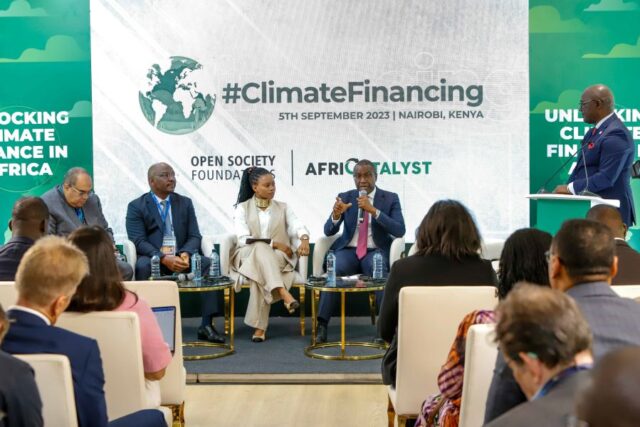MON, SEPT 11 2023-theGBJournal |With Africa requiring over $300 billion annually for climate adaptation, policymakers and government officials meeting at a high-level event on the sidelines of the Africa Climate Summit in Nairobi, have called for the implementation of innovative mechanisms to unlock climate financing.
The event cohosted by AfriCatalyst and Open Society Foundations (OSF), explored how the continent can successfully leverage on debt-for-climate swaps, carbon markets, and green bonds.
In his keynote address, Ibrahima Cheick Diong, the United Nations Assistant Secretary-General and Director General of Africa Risk Capacity Group (ARCG) stressed on the importance of exploring new paradigms to mobilize finances for climate adaptation.
“It can’t be business as usual – we need to innovate. We need to create a Triple A of climate finance; Adaptability, Affordability and Accessibility of climate finance. I believe that adaptation and mitigation can go hand in hand.”
Despite Africa contributing the least emissions, African countries are forced to spend 9% of their budgets annually to respond to growing climate disasters. Vera Songwe, non-resident fellow at Brookings Institute, underlined the need for effective governance and reforming policy frameworks to favor investments in climate initiatives such as renewable energy, green transition, and sustainable public infrastructure.
“Africa needs to get out of its slow growth- we need to ensure that we need to reform the global financing architecture to allow us have funding. Domestic resource mobilization from carbon markets is pivotal. A more transparent carbon market exchange will encourage this. In a perfect carbon market, Africa can earn about $50-180 dollars,” she noted.
Amadou Hott, the Special Envoy for the President of the African Development Bank (AfDB), highlighted the critical role philanthropy has in helping governments address the skill gap by helping them attract talent but also providing them with valuable capital that can serve as guarantees.
“This will enhance the creditworthiness of projects and make commercial banks and private equity to be comfortable. The way we have structured the Alliance for Green Infrastructure in Africa, is in line with how the partnerships should be done to mobilize climate finance at scale, we are looking at the entire value chain. We need upstream work from governments to set the right planning, vision and strategies to ensure we have NDCs.”
Seven months after the launch of the Africa Carbon Markets Initiative (ACMI) at COP27, sluggish progress has been made in utilizing the continent’s vast carbon sinks such as the Congo Forest – the world’s second largest forest and “second lung” of planet Earth” – which is estimated to hold 1.2 billion tons of carbon dioxide. During the event, Dr. Mahmoud Mohieldin, UN Climate Change High-Level Champion for COP27, called for the African countries to explore their rich carbon sinks to attract more financing through carbon markets.
“Africa has bankable projects and investable projects but they need better business environments, better regulatory incentives and better marketing opportunities. Integrated financial framework needs to be encouraged on national levels. Mitigation should come from private equity participation, adaptation should come from concessional finance. Loss and damage should come from grants.”
This year, AfriCatalyst has taken a leading role in shaping conversations on climate change in the continent. The Pan-African development advisory firm, based in Dakar, Senegal, publishes weekly analysis on climate-related policies that offers guidance to investors, policymakers, and media personnel. At the high-level event, AfriCatalyst launched its landmark policy paper titled “Upscaling and Upsizing Debt for Climate & Nature Swaps in Africa.” https://apo-opa.info/3sMpEQ3
The key takeaways include how the continent can restructure its debt to align with sustainable development goals and climate resilience, presenting a win-win situation for both external creditors and African nations. Debt for climate swaps is a fruit of collaborative partnerships and the policy instrument provides pathways to strengthen these networks. Speakers at the event also stressed the importance of African unity in addressing the challenges of mobilizing climate finance.
Also at the event, the Executive Vice President Finance Administration and Banking Services at the African Export Import Bank (Afrexim Bank), Denys Denya, underscored the pivotal role that multilateral development institutions play in providing guarantees, attracting external investors and financing initial roll-outs. Denya highlighted the bank’s commitment to collaborate with relevant players to answer the climate question.
“Africa Export Import bank has set up $500 million which will help in climate projects. The private sector considers some climate projects as risky. The public sector cannot by itself finance these projects. By providing concessional funding, grant funding and guarantees to investors to look at projects differently,” he said.
Twitter-@theGBJournal|Facebook-the Government and Business Journal|email:gbj@govbusinessjournal.com| govandbusinessj@gmail.com










